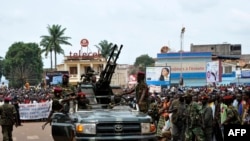Regional leaders meet Wednesday to discuss how to address the situation in the Central African Republic, where rebel forces overthrew the country's president last month.
Prime Minister Nicolas Tiangaye, who retained his post after the coup, is due to take part in the summit of the Economic Community of Central African States in Chad's capital, Ndjamena.
A South African delegation that includes President Jacob Zuma is also participating. A spokesman for South Africa's Foreign Affairs Ministry, Clayson Monyela says that the meeting is "crucial" in plotting the way forward.
2012
2013
"We want to preserve Africa as a zone of peace. We say no to unconstitutional change of government. We say no to people who come to power through the use of force," he said. "That's why the African Union has now taken the decision to suspend the membership of the Central African Republic as well as the decision to not recognize the rebels as a new government in the Central African Republic."
Monyela says the stability of the Central African Republic and its neighbors have to be a priority, and that any decision from the summit must support the position that unlawful seizures of power will not be allowed in Africa.
"We want to preserve this country, the Central African Republic, the region and broadly the continent as a zone of peace. And therefore coup d'etats, people who come to power through the use of force, through unconstitutional means, cannot be tolerated in this day in age," he added.
Michel Djotodia declared himself interim leader on March 25 after he and his Seleka rebel coalition overthrew President Francois Bozize. The African Union suspended the Central African Republic and has called for a return to constitutional order.
Thirteen South African soldiers died during the coup, as they attempted to block the path of thousands of fighters who poured into the CAR's capital, Bangui.
Prime Minister Nicolas Tiangaye, who retained his post after the coup, is due to take part in the summit of the Economic Community of Central African States in Chad's capital, Ndjamena.
A South African delegation that includes President Jacob Zuma is also participating. A spokesman for South Africa's Foreign Affairs Ministry, Clayson Monyela says that the meeting is "crucial" in plotting the way forward.
CAR Unrest Timeline
Timeline of CAR Unrest2012
- December: Seleka rebels seize one-third of CAR before starting talks with the government.
2013
- January 11: CAR and Seleka agree to cease-fire, allowing President Francois Bozize to maintain his position until 2016.
- February 3: A new government is founded with civilian opposition leader Nicolas Tiangaye as prime minister and Seleka leader Michel Djotodia as his deputy.
- March 11 - Rebels seize the southeastern towns of Bangoussou and Gambo.
- March 18 - Rebels call for the release of political prisoners and the departure of 400 South African troops. They detain five government ministers from the rebel coalition.
- March 24 - Days after ending cease-fire, rebels seize Bangui and Bozize flees the country.
- March 25 - Seleka rebel leader Michel Djotodia declares himself interim president.
Monyela says the stability of the Central African Republic and its neighbors have to be a priority, and that any decision from the summit must support the position that unlawful seizures of power will not be allowed in Africa.
"We want to preserve this country, the Central African Republic, the region and broadly the continent as a zone of peace. And therefore coup d'etats, people who come to power through the use of force, through unconstitutional means, cannot be tolerated in this day in age," he added.
Michel Djotodia declared himself interim leader on March 25 after he and his Seleka rebel coalition overthrew President Francois Bozize. The African Union suspended the Central African Republic and has called for a return to constitutional order.
Thirteen South African soldiers died during the coup, as they attempted to block the path of thousands of fighters who poured into the CAR's capital, Bangui.





